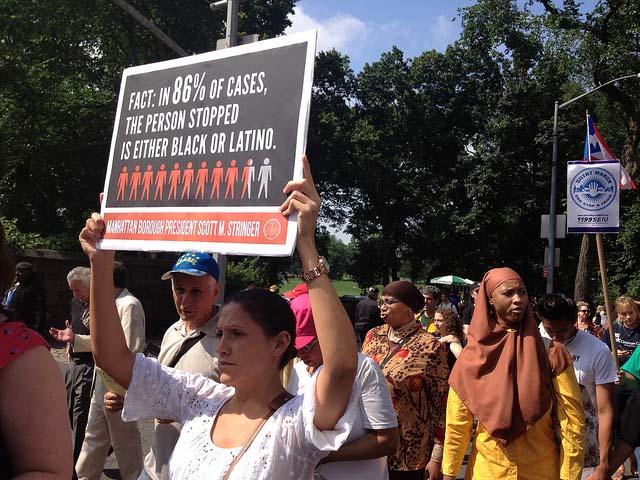By Thom Hartmann
 Silent march to end stop and frisk and racial profiling. (Photo: longislandains)
Silent march to end stop and frisk and racial profiling. (Photo: longislandains)
It’s time to get rid of the United States’ racist policing double-standards.
Earlier this summer, Kalamazoo, Michigan police officers were called to respond to reports of man, possibly drunk, acting belligerently and waving around a rifle.
When they arrived on the scene, the Kalamazoo officers found 63-year-old Joseph Houseman, a white man, who appeared to be intoxicated, and who was indeed waving around what looked to be an AK-47 assault rifle.
According to police reports of the incident, as well as dash cam footage and body microphones that were on the officers, it took nearly 40 minutes to get Houseman to peacefully surrender his weapon.
That same video and audio footage reveals how the police officers on the scene deliberated for some time over how to protect the public from Houseman, while protecting his right to openly carry a gun at the same time, under Michigan law.
The officers can be seen and heard talking with Houseman, trying to de-escalate the situation without resorting to violence.
In fact, when Houseman at one point told the officers to shoot him, one of them responded saying, “I don’t want to shoot you; I’m not here to do that.”
Eventually, the officers were able to subdue Houseman and take his gun, but decided against charging him.
So, in this case, when confronted with a white man who was acting belligerently and waving around a deadly assault rifle in the air, police officers talked the man down, didn’t resort to violence or brutality, and were able to bring the situation to a close.
This is how a white guy is treated by police in the US.
Now, let’s take a look at another situation that played out in St. Paul, Minnesota.
A cellphone video that was recently posted to YouTube shows a St. Paul police officer using excessive force against a black man, who was in a skyway, apparently just waiting to pick up his kids from school.
Initially, the officers ask the man his name and ask him why he’s waiting in the skyway.
After he explains to one officer that he has the right to be waiting in a public area, and says that he’s only be questioned because he’s black, another St. Paul officer shows up.
After a brief discussion with the new police officer, the man is forcefully restrained and even tased. He can be heard screaming for help.
He’s then heard saying that, “I didn’t do anything wrong, I didn’t break any laws and you tase me? That’s assault.”
This is a clear example of how the rules are different if you’re black, and of the racist policing double-standards in the US today.
Fortunately, more and more people are realizing this, and are using video cameras to record their interactions with police, because they want to get anything that might be illegal on tape.
In a video uploaded to YouTube this past week, a man can be seen talking to police officers, who were looking for a wanted felon.
The officers repeatedly ask the man to turn off his cellphone video camera, but knowing his rights, the man does not.
They also ask to enter the man’s house because they think he might be “harboring a fugitive” but since they don’t have a warrant, the man tells them they cannot.
After a three minute exchange, the officers eventually leave.
But here’s the thing.
We shouldn’t live in a country where you need to worry about your race, or where you live, or whether or not you have a cellphone to record police actions.
This is the 21st century and the “land of the free and the home of the brave,” and it’s time our policing reflected that.
That can be accomplished by introducing national standards for policing, so that officers are behaving well in New York City and in Ferguson, Missouri.
We also need to pay our police officers better, and raise hiring standards. They put their lives on the line each and every day, yet all across the country, they’re drastically underpaid and poorly trained or supervised. That needs to change.
Finally, we need to provide more funding for community policing programs that encourage police officers to become members of the community, instead of feared figures.
It’s time to get rid of the racist double-standards, and bring sensible policing back to the US.















